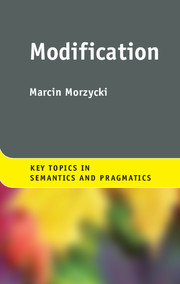1 - Preliminaries
Published online by Cambridge University Press: 05 November 2015
Summary
Two Problems
There are at least two significant problems with writing a book about the semantics of modification. The first is that it's not at all clear what modification is, precisely. The second is that it's not at all clear whether it is – that is, whether it exists as a single coherent grammatical phenomenon.
‘Modification’ and ‘modifier’ are the sorts of terms that we routinely use as though they had agreed-upon theoretical content. Yet they're useful in part precisely because, as McNally (forthcoming) observes, they lack a generally accepted, formally explicit theoretical definition. In the absence of a theoretical definition, it wouldn't be unreasonable to expect a clear descriptive one. Even here, though, we may need to set aside the ‘clear’ and, for that matter, the ‘one’. In most contexts, to say that something is a modifier, or that it modifies something else, is not to make a falsifiable claim. Of course, that doesn't mean such claims are inherently suspect, but it's best not to have any illusions about how much weight they can bear.
That's the first problem, the terminological one. The second problem is more profound: to solve the first problem and provide a solid definition of modification, it would really help if it were a single phenomenon or natural class of phenomena. But it may be that ‘modification’ is merely a cover term for a motley assortment of constructions, facts, and puzzles that may, in various combinations, have some features in common.
Of course, it's not necessary to solve these problems in order to talk about them. Perhaps it's only in talking about them at some length that one can begin to address them. It might be an interesting journey, even if it turns out that modification isn't really a useful notion semantically. Nevertheless, the term appeals to us for some reason. Surely we should ask whether it does so because there is, in fact, a genuine grammatical insight behind it, something in the real world to which it refers?
Before we can address this, there is some practical business to attend to.
What This book is and Isn't
This book is about formal linguistic semantics. That said, I really hope it might prove useful to people approaching it from other theoretical and methodological perspectives as well – if nothing else, in its characterization of the facts and of various particular puzzles.
- Type
- Chapter
- Information
- Modification , pp. 1 - 12Publisher: Cambridge University PressPrint publication year: 2015



